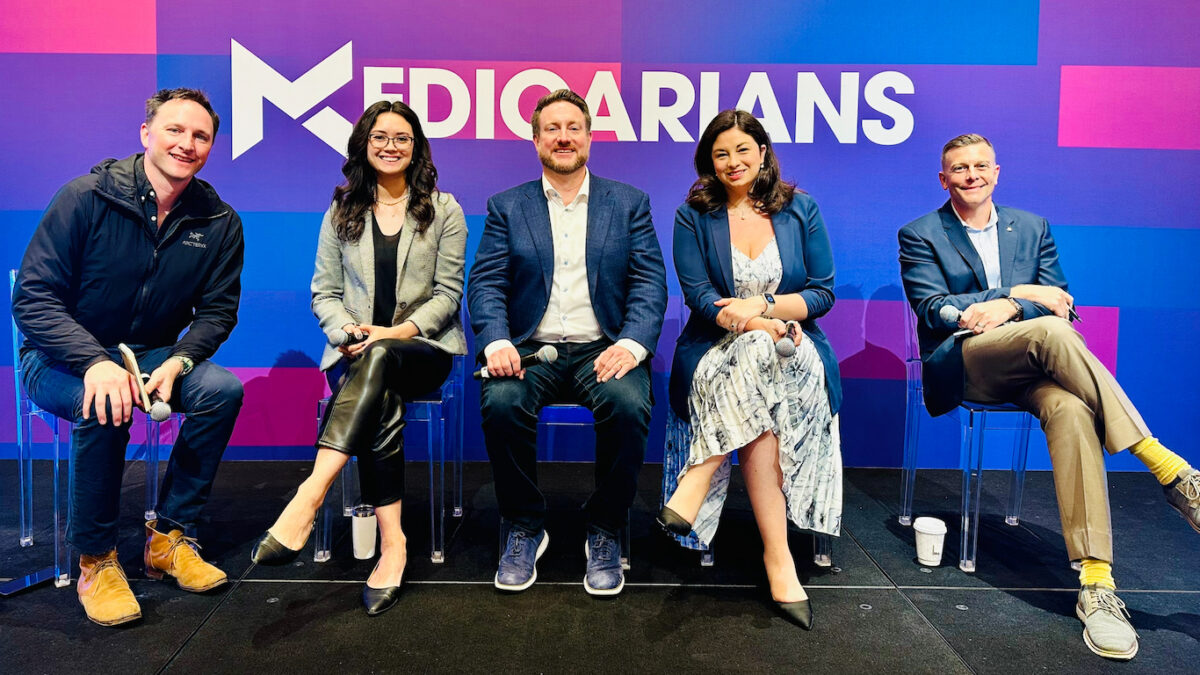Medicarians 2024 takeaways: Addressing SDOH with carefully earned trust, thoughtful health interventions

(Pictured at Medicarians 2024 from left to right: Jim Meyerle, founding general partner, Prufrock Ventures; Amanda Rees, CEO & co-founder, Age Bold; Ed Likovich, CEO, Nymbyl Science; Dr. Francesca Rinaldo, SVP of clinical product & innovation, Sharecare; and Daniel Murphy, general manager – government solutions, The Helper Bees).
The demographic shifts and societal trends we’re witnessing are heralding a pivotal moment in healthcare. As the number of aging adults increases—many of whom face heightened risks in various areas—their complex care needs are intensifying. Compounded by a declining pool of healthcare professionals, the industry faces significant challenges. Moreover, poor social determinants of health (SDOH)—often hard to identify and address—add another layer of complexity to providing essential care.
Yet, my discussions at this month’s Medicarians conference with leading industry figures left me optimistic about overcoming these challenges through a holistic and integrated strategy. SDOH factors such as social isolation, loneliness, fall risk, and various barriers to care all require us to consider how we can enable health plans, self-insured employers, and providers to better connect the dots on behalf of the member populations we serve, by bringing together all stakeholders from across the healthcare ecosystem.
During the conference, I highlighted Sharecare’s role in enabling health plans to address these social determinants effectively. Through our home care solution, CareLinx, we see how matching caregivers with care recipients and their families not only meets immediate needs to keep members healthy and independent, but also how the presence of trusted caregivers in the home opens doors to broader strategic health initiatives and alignment with care management teams.
The ongoing shift in the Medicare Advantage and supplemental benefits sectors presents a prime opportunity for health plans to adopt solutions addressing the full spectrum of member needs. Payors are evaluating their entire portfolios and benefits ecosystems to derive and maximize value with better collaboration and integration. By employing a strategic consolidation of benefits, rather than leveraging a single point solution, payors can instead deploy offerings that can successfully target and hit multiple categories of their improvement strategies around cost, quality, and member experience.
When strategically integrated by health plans, tech-enabled caregivers become a critical resource. They offer “high-touch” support that complements “high-tech” tools, enhancing the effectiveness of digital therapeutics and other programs within Sharecare’s extensive digital health ecosystem. This synergy not only maintains but also enhances in-home care management and risk identification.
Furthermore, our findings show that individuals identified with social isolation and loneliness through clinically validated tools not only see improvements in these areas but also exhibit increased engagement in wellness programs and healthcare management due to caregiver intervention. Caregivers help overcome various barriers to care, such as transportation or scheduling challenges, and facilitate comprehensive in-home assessments for accurate health evaluations.
Empowered by these tools, Sharecare’s care managers utilize caregivers to effectively mitigate adverse social health determinants. Whether serving a large employer or a health plan, caregivers can swiftly identify issues, enabling in-person evaluations that enrich data collection and refine care strategies. The positive outcomes and robust data we’re gathering energize ongoing industry collaborations and highlight the significant benefits of our integrated, digital-first approach complemented by personal support.
This conference not only reaffirmed the critical role of innovative health solutions in addressing today’s healthcare challenges but also emphasized the importance of building and maintaining trust within healthcare communities to foster a healthier future for all.